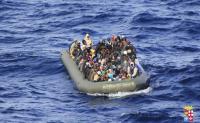-
9/11 attacks merged U.S. immigration and terrorism efforts at Latinos' expense: Study

After September 11, issues of immigration and terrorism merged, heightening surveillance and racializing Latino immigrants as a threat to national security, according to researchers. Latino immigration in the United States has long sparked passionate debates, with Latinos often racialized as “illegal aliens” posing an economic threat. But following the al-Qaeda-led terrorist attacks on Sept. 11, 2001, the fear of another attack, coupled with Islamophobia, streamlined immigration agendas with anti-terrorism rhetoric, policies, and institutional efforts, racializing Latinos in a new way, the researchers said.
-
-
Of immigrants and terrorists
In a speech on Monday at Youngstown State University in Ohio, Donald Trump continued to modify his approach to immigration: Rather than bar all Muslims from entering the United States, or bar Muslims from conflict-saturated regions of the world, he said he would bar immigration from countries “compromised” by terrorism. These proposals, however, have little, if anything, to do with preventing acts of terrorism in the United States or making the United States safer.
-
-
Europe-wide failure to anticipate, tackle "colossal" migration crisis
After a year-long inquiry, the U.K. Parliament’s Home Affairs Committee says EU action to address a crisis it should have foreseen has been “too little, too late,” with the EU-Turkey agreement a partial solution at best which raises serious humanitarian, human rights, logistical and legal concerns. The committee notes that current numbers of people seeking to move into Europe are “unprecedented in modern times – with 1,255,640 first-time applications for asylum in EU member states in 2015, double the 562,680 in 2014.
-
-
CBP expands Global Entry to Colombian citizens
U.S. Customs and Border Protection (CBP) announced the other day the expansion of Global Entry to citizens of Colombia. Global Entry, a CBP Trusted Traveler Program, allows for expedited clearance of pre-approved, low-risk travelers. Colombia becomes the first country in South America and the eighth country overall whose citizens will be eligible to enroll in Global Entry.
-
-
Syrian asylum-seeker who blew himself up in Ansbach, Germany, was about to be deported
A 27-year old Syrian refugee whose asylum application had been denied, and who was about to be deported to Bulgaria, blew himself up Sunday evening outside a wine bar in the Bavarian town of Ansbach. Twelve people were injured in the explosion, three of them seriously. The past week was a particularly violent week in Germany, with a 21-year-old Syrian refugee knifing a woman to death in the city of Reutlingen on Sunday, and a mentally unstable 17-year old German teenager of Iranian descent, who was obsessed with mass shooting, killing nine people on Friday in a shopping mall in Munich, before turning his gun on himself.
-
-
Revisiting a program leading to mass criminalization, incarceration of undocumented migrants
Immigration reform advocates argue that Operation Streamline, launched in 2005 as part of DHS’s Secure Border Initiative, has failed to deter or reduce illegal border crossings, but has had other, unwanted consequences. Among them: A national federal court docket, 49 percent of which was occupied in 2015 with the prosecution of 70,000 migrants for improper entry and re-entry, leaving fewer resources for the prosecution of more serious federal crimes, and a federal prison population, 23 percent of which is now composed of non-citizens, although these non-citizens represent only 7 percent of the U.S. population.
-
-
New Border Patrol chief faces uphill battle to reform agency
As the first outsider appointed to run the Border Patrol in its 92-year history, former FBI official Mark Morgan starts his new job this week as chief with a target on his back. The selection of Morgan, a career FBI official, to run the 20,000-strong force sends a clear message: The Border Patrol has a culture problem that needs to be fixed. But with just seven months left in the Obama administration, the question remains whether Morgan can right an agency in turmoil or whether his appointment is merely symbolic.
-
-
Feds tight-lipped on weeding out corrupt border agents
In a video message intended for the tens of thousands of men and women working to keep drugs and people from illegally entering the United States, then-Deputy Border Patrol Chief Ron Colburn wanted to leave little doubt about the consequences for those who betrayed their mission. But whether most — or even a significant fraction of — corrupt federal border agents really are caught and punished is an open question.
-
-
Danish police confiscate money, valuables from asylum seekers to pay for upkeep
Danish police have taken valuables from asylum seekers for the first time since a controversial law was passed in January, requiring that asylum seekers pay for part of their upkeep by surrendering cash, jewelry, and other valuables to Danish authorities. The law allows police to search asylum seekers on arrival in the country and confiscate any non-essential items worth more than 10,000 kroner, and which have no sentimental value to their owner.
-
-
Europeans’ attitudes to migration do not depend on net migration levels

A new study has analyzed attitudes to immigration across twenty-one European countries and finds that negative attitudes do not appear to be linked with net migration rates. Some countries with high immigration levels are also very positive about migrants, such as Norway, while other countries like the Czech Republic and Hungary, which have low immigration. have populations with negative attitudes. U.K. respondents’ support for immigration is slightly lower than the European average, but they also have a slightly more positive view of migrants’ contribution to their country compared with a decade earlier.
-
-
CBP issues long-anticipated Biometric Exit Program RFI
Last Monday, the Department of Homeland Security (DHS) issued its highly-anticipated call to industry to share solutions for the Biometric Exit Program. The Request for Information (RFI), issued by U.S. Customs and Border Protection (CBP), explains that CBP intends to add biometrics to confirm when foreign nationals are departing the United States, in order to deter visa overstays, to identify criminals, and to defeat imposters.
-
-
4-4 Supreme Court tie keeps Obama's sweeping immigration reforms blocked

A 4:4 tie at the Supreme Court has dealt Barack Obama’s immigration program – and his legacy — a major setback. The president took his executive action to shield about four millions of undocumented immigrants from deportation after House Republicans refused to bring to the floor for a vote a 2013 bipartisan Senate legislation which provided a path to citizenship for illegal immigrants. Twenty-six states with Republican governors challenged Obama’s executive action, arguing that Obama had exceeded his authority by granting a blanket deportation deferment to millions of undocumented immigrants. A federal judge in Texas ruled in favor of the twenty-six governors, and the U.S. 5th Circuit Court of appeals upheld that Texas court’s decision last November.
-
-
After 4 years CBP IA disabled vet still mired in employment procedures

Lieutenant Commander J. Gregory Richardson (retired), a decorated Naval officer with almost thirty years of military service to his country, maintains that while employed as a GS-14 Senior Security Analyst in the Integrity Programs Division (IPD) at Customs and Border Protection Internal Affairs (CBP IA), his immediate supervisors and the Senior Executive at CBP IA repeatedly ignored his multiple medical issues. The failure of these supervisors, alleges Richardson, led to a deterioration in his medical conditions until, finally, he could no longer endure the pain from which he suffered. He missed many days at work, and this absenteeism, according to documents provided, was a major reason he was fired from IPD. Since 2013 Richardson has been seeking information from CBP about any investigations or reports about him while he was an employee.
-
-
Scanners more rapidly and accurately identify radioactive materials at U.S. borders, events

Among the responses to the 9/11 terrorist attacks, DHS, among other things, has increased screening of cargo coming into the country. At MIT, the terrorist attacks gave rise to a company dedicated to helping DHS — and, ultimately, other governments and organizations worldwide — better detect nuclear and other threats at borders and seaports. Today, Passport — co-founded in 2002 by MIT physics professor emeritus William Bertozzi — has two commercial scanners: the cargo scanner, a facility used at borders and seaports; and a wireless radiation-monitoring system used at, for example, public events.
-
-
2015 global forced displacement breaks records
Wars and persecution have driven more people from their homes than at any time since the UN began keeping refugee records. A new, detailed study which tracks forced displacement worldwide found a total 65.3 million people were displaced at the end of 2015, compared to 59.5 million just twelve months earlier. The report found that, measured against the world’s population of 7.4 billion people, one in every 113 people globally is now either an asylum-seeker, internally displaced, or a refugee.
-
- All
- Regional
- Water
- Biometrics
- Borders/Immig
- Business
- Cybersecurity
- Detection
- Disasters
- Government
- Infrastructure
- International
- Public health
- Public Safety
- Communication interoperabillity
- Emergency services
- Emergency medical services
- Fire
- First response
- IEDs
- Law Enforcement
- Law Enforcement Technology
- Military technology
- Nonlethal weapons
- Nuclear weapons
- Personal protection equipment
- Police
- Notification /alert systems
- Situational awareness
- Weapons systems
- Sci-Tech
- Sector Reports
- Surveillance
- Transportation
Advertising & Marketing: advertise@newswirepubs.com
Editorial: editor@newswirepubs.com
General: info@newswirepubs.com
2010-2011 © News Wire Publications, LLC News Wire Publications, LLC
220 Old Country Road | Suite 200 | Mineola | New York | 11501
Permissions and Policies
Editorial: editor@newswirepubs.com
General: info@newswirepubs.com
2010-2011 © News Wire Publications, LLC News Wire Publications, LLC
220 Old Country Road | Suite 200 | Mineola | New York | 11501
Permissions and Policies
